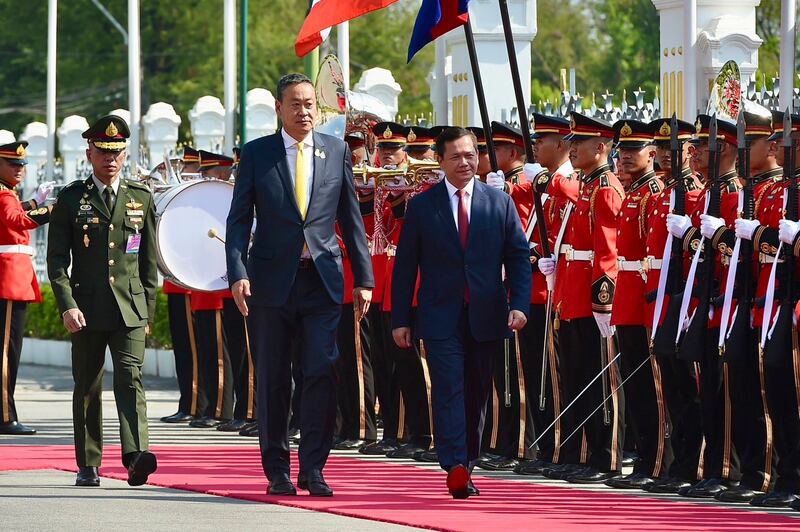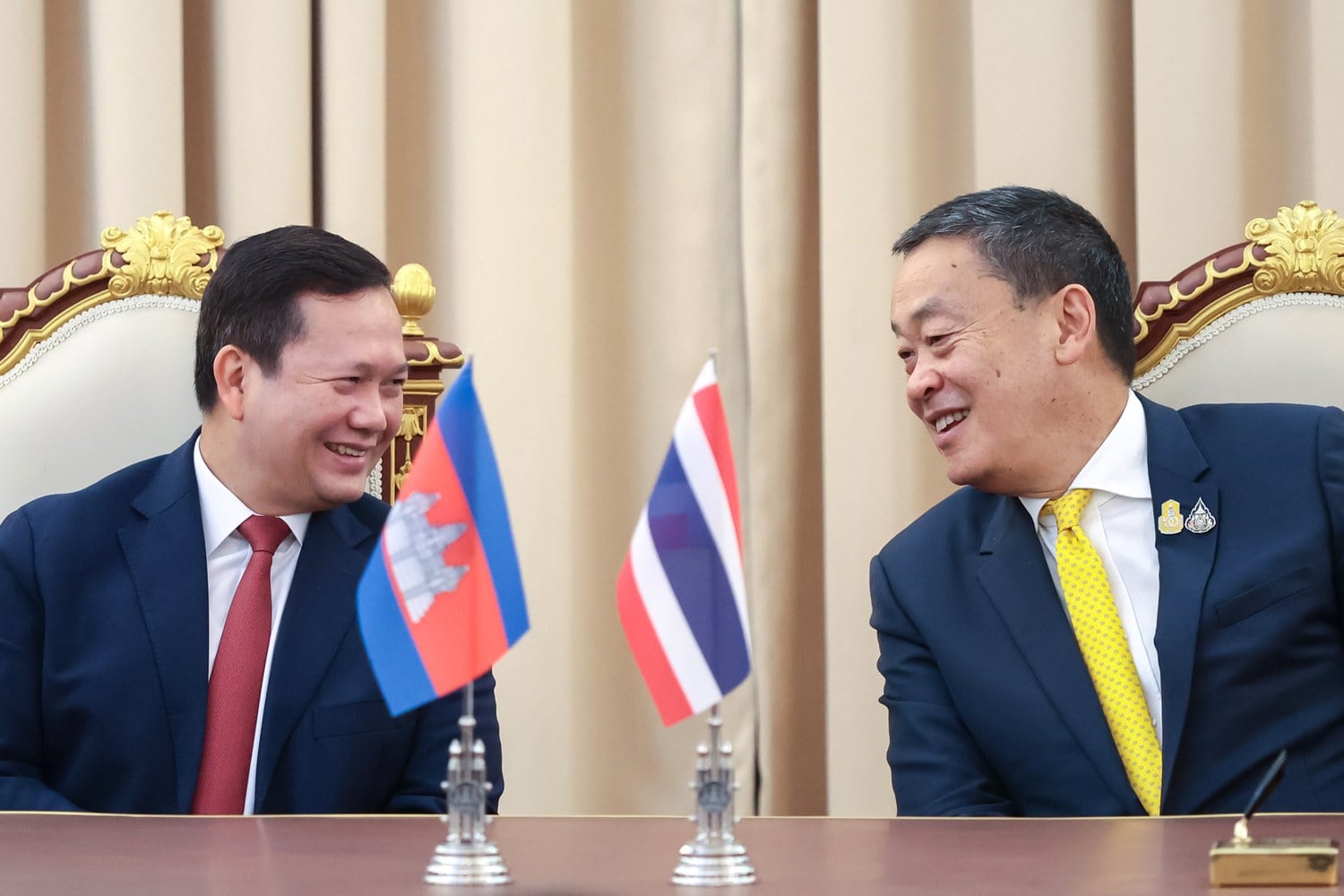Updated Feb. 07, 2024, 08:35 a.m. ET.
The prime ministers of Thailand and Cambodia on Wednesday vowed to crack down on what they called "interference" in Cambodian politics by Thai-based political activists.
Hun Manet’s first visit to Bangkok since becoming Cambodian leader last year came after Srettha Thavisin chose Cambodia as his first official foreign trip as Thailand’s prime minister in September.
“I’ve assured Prime Minister Hun Manet that it’s Thailand’s policy to not allow anyone to use Thailand as a platform to interfere in internal affairs or conduct harmful activities against our neighboring countries,” Srettha told a news conference at Government House.
Activist arrests
Last week, Thai immigration police arrested three activists, as well as their wives and four children, ahead of a threatened protest on Hun Manet’s arrival.
They included Kong Raiya, who was jailed twice for his outspoken criticism of the Cambodian government and his children; Lim Sokha, a senior member of the opposition Candlelight Party, which was barred from last year’s national election; and opposition activist Phan Phana.
Two activists for the now-dissolved Cambodia National Rescue Party, Chhorn Sokhoeun and Chhorn Chorn Ny, were arrested hours before they could start the protest slated for Wednesday morning, according to a Cambodian asylum seeker in Bangkok and a Thai official, both of whom declined to be named for security reasons.
“I don’t fear being arrested because I’m fighting for freedom,” Sokhoeun told Radio Free Asia on Tuesday before his arrest.
He said 300 to 400 Cambodian migrants were set to stage a protest to urge Hun Manet to stop persecuting refugees, release political prisoners and resolve the issue of some Cambodian migrant workers being restricted in traveling to Thailand. However, the protest did not take place following his arrest.
The five activists had recently fled to Thailand to seek asylum and had been granted refugee status, Phan Phana told RFA.
The immigration bureau did not immediately respond to RFA’s inquiries about their detention.
The deputy Asia director of Human Rights Watch said it was “shameful” that the new Thai government was arresting Cambodian refugees.
“These refugees should be immediately and unconditionally released and permitted to seek safety and protection in a third country if that is what they want,” Phil Robertson told RFA.
Hun Manet, thanked the administration of Thai Prime Minister Srettha Thavisin for quashing the actions of the Cambodian anti-government activists in Bangkok.
“The Cambodian government also gives a commitment to not allowing Cambodian soil to be used as land for conducting activities to interfere with Thailand or causing issues in Thailand,” he said.
“This is for mutual respect, mutual benefits for our countries to promote stability and trust and confidence and also for strengthening our relationship together.”
Human Rights Watch’s Robertson said that Manet’s praise for the arrests, “shows that he really is the new face of transnational repression in the Mekong sub-region.
“By trying to wipe out any sign of dissent both in Cambodia, and among the Khmer diaspora, Hun Manet is trying to surpass his father in dictatorial control and rights abusing actions,” Robertson added.
Then-Prime Minister Hun Sen had long sought help from Bangkok in pursuing his critics in Thailand.
On June 4, 2020, Thai activist Wanchalearm Satsaksit was abducted by gunmen in front of his Phnom Penh apartment complex, a day after he posted a video on Facebook criticizing the Thai government. It’s not known what subsequently happened to him.
Wanchalearm fled to Cambodia from Thailand after Thai authorities issued a warrant for his arrest in June 2018, accusing him of violating the Computer Crimes Act for operating a Facebook page deemed critical of the Thai government.
Overlapping claims
The two prime ministers also worked to advance a long-running dispute over fossil fuel reserves at their Wednesday meeting.
Thailand and Cambodia both assert ownership of an area of ocean covering roughly 27,000 square meters (10,425 square miles) in the Gulf of Thailand. The overlapping claims area could hold 11 trillion cubic feet of natural gas, large quantities of condensate and oil, according to CLC Asia, a government affairs and corporate advisory firm headquartered in Bangkok.
In order to solve the differences, Thailand and Cambodia signed a memorandum of understanding in 2001 to attempt to delineate the maritime border and to form a joint development area for resource-sharing.
But verifying the entire 798-kilometer border drawn during the French colonization of Indochina has proved difficult, stalling the endeavor for over 20 years.
During the meeting, Srettha said he raised the issue of energy security as part of the 7-point discussion, citing the huge amount of fuel each country imports each year.
“In this regard, we agree to discuss further the joint exploration of the hydrocarbon resources in the overlapping claims area between the two countries,” he told the press conference. “At the same time, we attach importance to maritime delimitation and agree to discuss the issue simultaneously with our exploitation of hydrocarbon resources.”
He said he would instruct the minister of foreign affairs to consult with other authorities concerned, including the minister of energy and the Royal Thai Navy on the issue for further discussion with the Cambodian side.

There was no mention of the thorny issue of the Preah Vihear temple complex on the Thai-Cambodian border.
Hun Manet, a graduate of United States Military Academy West Point, was in command of Cambodian forces around the temples when the two countries clashed several times over ownership between 2008 and 2011.
Thousands of troops are still deployed along both sides of the border, and access to the temple from the Thai province of Sisaket remains off limits.
In 2013, a judgment by the International Court of Justice ordered Thailand to withdraw its forces in honor of a 1962 resolution that awarded the temple complex to Cambodia.
Edited by Mike Firn and Taejun Kang.
Updated to adjust headline and lead paragraph.

